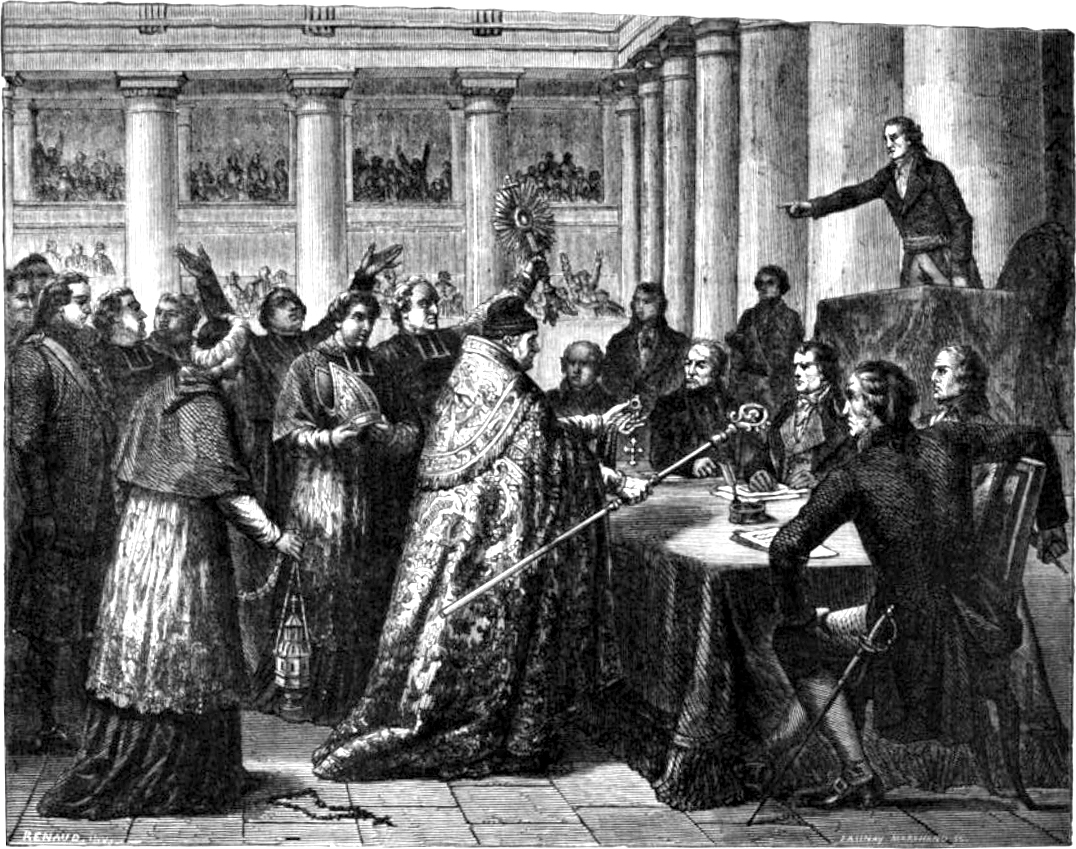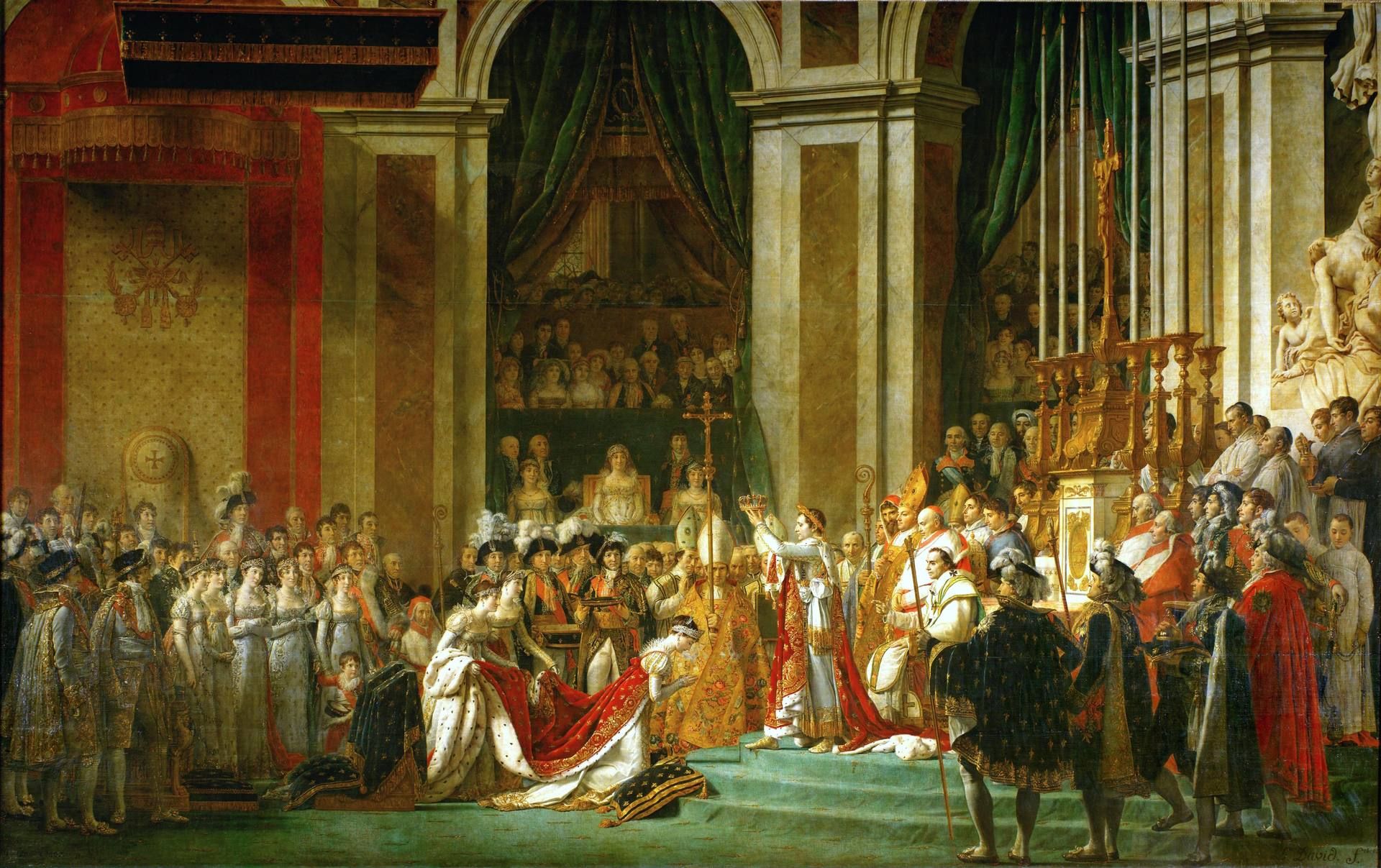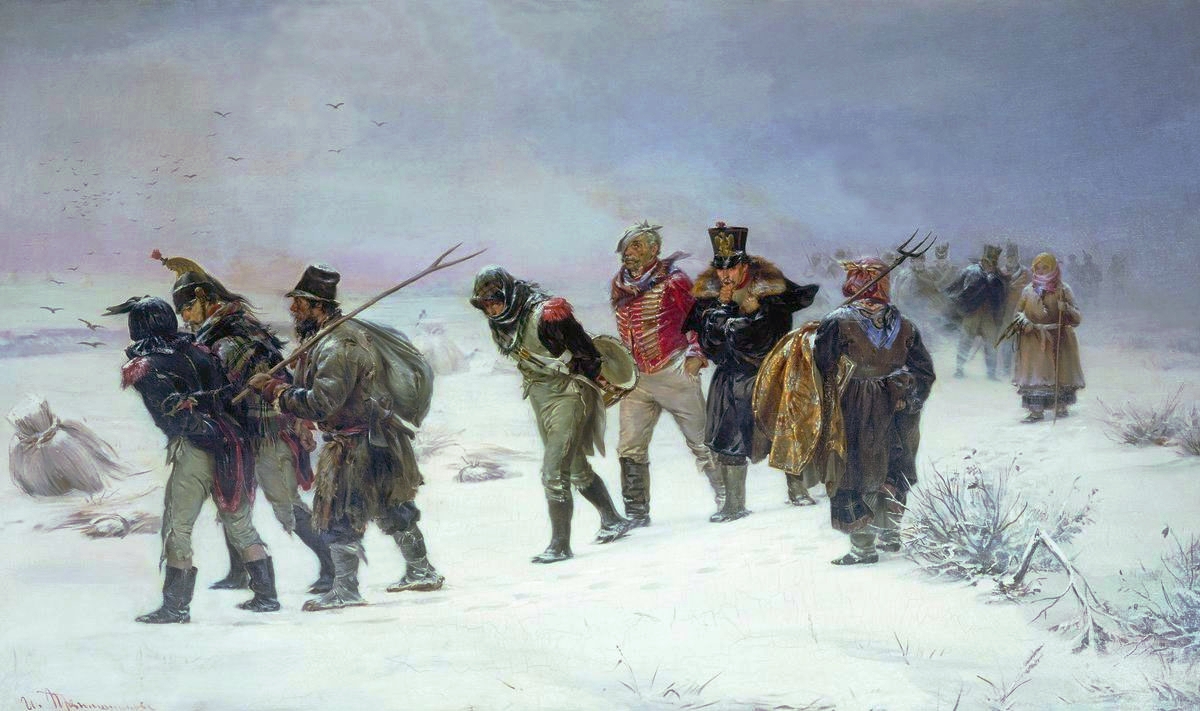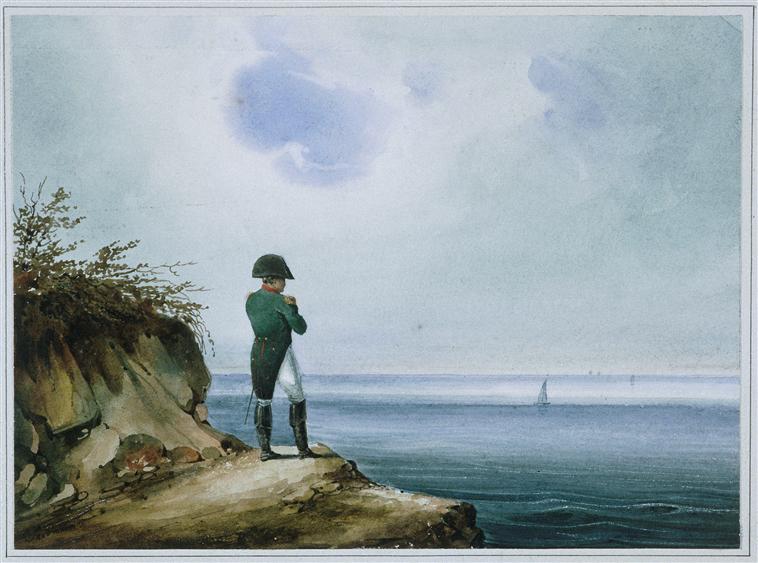
The Napoleonic Era (1799-1815) was the period in which Napoleon Bonaparte ruled over France. He was a general of the French Army during the French Revolution, and he realized the weakness of the civil government. Thus, he staged a coup d’état against the government of the National Directory and rose to power with the help of politicians and intellectuals. Although this meant the end of the Revolution, some revolutionary ideals persisted while Napoleon was in charge of the country. His successive administrations modernized France and turned it into a postulant for hegemony in Europe. However, the absolutist monarchies of the continent were opposed to Napoleon and they ultimately prevailed, defeating France and sending its leader to permanent exile.
Summary of the Napoleonic Era
- Napoleon was a rising star of the French Army and he colluded with politicians and intellectuals to topple the government of the last phase of the French Revolution — the National Directory.
- Initially, Napoleon became one of the three Consuls of France, in a power-sharing arrangement that was restricted to 10 years, but did little to curb his authoritarian tendencies. In 1802, approximately 99% of voters allowed Napoleon to become “First Consul for Life”, following a referendum.
- During the Consulate (1799-1804), Napoleon’s main goals were to make peace with foreign adversaries, reorganize domestic politics, and modernize the economy. All of those goals were met.
- In 1804, France held a second referendum, in which the population allowed Napoleon to change his status to Emperor of the French.
- During the First French Empire, Napoleon attempted to conquer hegemony in Europe, by invading and subjugating neighboring countries. However, the inability to defeat England and the difficulties to invade Russia ultimately made Napoleon an easy prey for foreign powers.
- In 1815, Napoleon was defeated and sent to exile on Elba Island. Yet he managed to escape from there, get back to France, and briefly lead the country before being defeated once more, at the Battle of Waterloo.
- Finally, Napoleon was sent to exile on Saint Helena Island, where he would die a few years later. Meanwhile, foreign powers restored the Bourbon monarchy in France, under the control of King Louis XVIII.
- Some consequences of the Napoleonic Era were changes to Europe’s political map, the independence of American countries, the rise of Great Britain as the main European power, and the development of certain economic sectors associated with life during the Napoleonic Wars.
The Consulate (1799-1804)
In 1799,Napoleon Bonaparte took power in a structure called the Consulate, because it had three Consuls who shared the Executive Power. He was the First Consul and his term was supposed to last 10 years. At this position, he had the biggest authority and the functioning of the entire political system depended on him. From them on, a series of French Constitutions were elaborated, and they mostly reinforced Napoleon’s power. A positive development, however, was the return of the universal manhood suffrage — after all, voting rights had been restricted to the propertied class during the last phase of the French Revolution .
Initially, the government’s main concern were the interminable wars with the monarchies of Europe. Since the early days of the Revolution, France’s neighbors realized that the overthrow of King Louis XVI could encourage other European populations to do away with their monarchs, too. That is why they mounted successive coalitions against the revolutionaries. Even though the French Army was able to score significant victories in these wars, the constant state of conflict was a risk to the stability of the nation. Therefore, after rising to power, Napoleon wanted to make peace with the rest of the continent.
The war against Austria ended with the Peace of Lunéville (1801). This treaty was highly favorable to the French, who would gain territory and would continue to exert influence over revolutionary governments in the Netherlands and in Switzerland. Meanwhile, the war against England ended with the Peace of Amiens (1802). It was a more balanced treaty, because France and England would relinquish control of certain territories each of them had acquired during the war. In addition to ending these wars, Napoleon celebrated the Concordat of 1801 with the Pope, an agreement that reconciled France with the Catholic Church, yet allowed the state to keep much of its power in religious matters.

Domestically, the Consulate government was quite productive. It implemented a series of measures intended to modernize the country, such as:
- Promulgation of the Napoleonic Code (Civil Code of the French): According to this piece of legislation, workers’ strikes were an assault on the economy, thus they were forbidden. Also, women’s rights, such as the right to vote, were contingent upon the wishes of their fathers and husbands.
- Measures to ensure capital accumulation: Because the state needed money urgently, it reorganized the tax system, sold Louisiana to the United States, and created state institutions that fostered economic progress. Also, it encouraged the economic exploitation of land, both within France, by enacting a land reform, and outside France, by looting occupied countries.
- Measures to improve administrative efficiency: French government became more centralized, for instance, by dividing the country’s territory into a series of departments with roughly the same area. Also, the educational and the judiciary systems were reformed.
- Measures to improve French infrastructure: Napoleon ordered the draining of swamps and the construction of roads, bridges and new government buildings — including memorials that honored himself.
Although those who opposed Napoleon were repressed by the government and there was no freedom of the press, life under the Consulate was agreeable. This made Napoleon an extremely popular figure among the French, and allowed him to call for a referendum in 1802. This vote turned him from “First Consul” to ” First Consul for Life “, with approximately 99% of voters being in favor of this change. Nevertheless, Napoleon’s thirst for power was insatiable, and he decided to go forward with another referendum, in 1804. This time, approximately 99% of voters allowed him to become ” Emperor of the French “. That was the end of the Consulate and the beginning of the First French Empire.

The Empire (1804-1815)
It was an apparent contradiction having Napoleon as monarch, because one of the goals of the French Revolution had been the overthrow of the monarchy. Yet many revolutionary ideals persisted under the Napoleonic Empire. For instance, France continued to be ruled by a constitution, and the principles of liberty, equality and fraternity were still generally respected. In fact, the great issues during this period were international, because Napoleon turned to conquering the world, while neighboring countries continued to fight against the French.
According to the historian Eric Hobsbawm, the most important rivalry at the time was that between France and Britain, and each country perceived it differently. The British thought it was a purely economic matter, because they advocated a balance of power in continental Europe, but wanted to keep their hegemony in the seas and in the colonies. Meanwhile, the French thought the rivalry was much more than economic, because their goal was to destroy Britain entirely. In any case, both of them were only interested in total victory.
In 1805, Napoleon attempted to invade Britain by sea, but the French Navy suffered a crushing defeat at the Battle of Trafalgar. This made him focus, at first, on subjugating his continental enemies — after all, it is far easier to move troops over land, and the French Army was known for its competence. Thus, his soldiers defeated Austria, Prussia and Russia, one after the other, whilst imposing unequal treaties on them and reorganizing their territories. In 1807, France signed the Treaties of Tilsit with Prussia and Russia. The former became a vassal state, while the latter was forced to become a French ally. So great was the humiliation imposed on these former powers that Napoleon’s foreign minister, Talleyrand, handed over his resignation in protest against it.
In the meantime, the inability to invade Britain made Napoleon issue the Berlin Decree and the Milan Decree. These orders inaugurated the Continental Blockade or Continental System: all European countries were prohibited from trading with the British. This was meant as a way to strangle British economy while favoring the French merchant navy and bourgeoisie. However, there were several factors that made this attempted blockade of England unsuccessful:
- European countries needed industrial goods from Britain, which was the major industrial power then, and the French could not supply them.
- European countries needed to sell their agricultural goods, but France produced those very same goods, thus would not import them. Only Britain could absorb the market for foodstuffs properly.
- In retaliation for the Continental System, Britain threatened to seize all vessels engaged in trade with the French, and launched violent attacks against those that aligned themselves with France.
Over time, Europeans disregarded Napoleon’s orders, and he had to retaliate against them. In 1807, Spain and France signed the Treaty of Fontainebleau, according to which both would invade Portugal — a traditional British ally that seemed reluctant to abide by the Continental Blockade. The French Army got to Portugal through Spanish territory, but the passage of troops was traumatizing, to say the least. The Spanish population staged a revolt against King Charles IV for getting involved in Napoleon’s plans, and he abdicated in favor of his son, Ferdinand VII. However, both father and son ended up placed in house arrest by Napoleon himself, and his brother Joseph Bonaparte became King of Spain. The Portuguese royals had better luck, because Britain helped the House of Braganza flee to Brazil and escape the danger of losing power altogether.
The End of the Empire (1812-1815)
In 1807, the Treaty of Tilsit forced Russia to become a French ally, and as a result the country adopted the blockade against England. However, in 1809, France annexed the Austrian territory of Western Galicia to one of its client states. This was against the interests of the Russians, who believed that the region could be used as a potential launching point for an attack against them. That is why, on 31 December 1810, Tsar Alexander decided to abandon the Continental System.
Suddenly, Napoleon lost a key ally in the struggle against British dominance over the seas. Yet things worsened over the following years, because Alexander wanted to pursue expansionist policies and he would not let France keep its military presence in Prussia and in Western Galicia. As such, in 1812, Russia issued an ultimatum to the French, demanding the withdrawal of troops from these regions. In the face of this affront, Napoleon declared war against Russia and began moving troops over its borders. At first, the French Army made progress while the Russians retreated. But the latter smartly employed scorched earth tactics, leaving behind abandoned cities, burned fields and broken infrastructure. Thus, Russia trapped the French in a grim theatre of war amidst the harsh Russian winter.

Not being able to dominate Russia, Napoleon’s men were forced to retreat and, while doing so, their adversaries had time to react. In 1813, Austria, Prussia, Sweden and Russia overpowered the French at the Battle of Leipzig. In the following year, the foreign powers invaded Paris and Napoleon was forced to abdicate. While these powers met at the Congress of Vienna (1814-1815), Napoleon was sent to exile on Elba Island. By a decision of Europe’s leaders, all dynasties that had been deposed by Napoleon would regain their thrones. Thus, the brother of guillotined king Louis XVI, Louis XVIII, began to rule over France.
Nevertheless, by taking advantage of his private security guards, Napoleon managed to escape from Elba Island — located near the Italian coast. In 1815, while Europe’s monarchs and their representatives convened in Vienna, Napoleon got back to France, reunited his army, and mounted another challenge to European order. This period became known as the Hundred Days, because for 110 days Napoleon successfully remained in power. However, the counterrevolutionary coalition soon came to the rescue of Louis XVIII. At the Battle of Waterloo, the Napoleonic troops were defeated one final time. After that, Napoleon was exiled to Saint Helena Island — much farther from Europe, and where he would die a few years later, in 1821.
Consequences of the Napoleonic Era
The Napoleonic Era was a lengthy and important period in European history, because it kept many aspects of the French Revolution, yet it had many more contradictions. Napoleon went from being a general of a movement against the monarchy to being the very King of a much-changed France. The Napoleonic Wars brought about political, economic and social changes that would mostly persist even after the restoration of the Bourbon dynasty in France. These were some of the most important consequences of this period:
- The European map was reorganized: Because Feudalism was completely dismantled, the modern European state prevailed as the only acceptable type of national-political entity in Europe at the time.
- Great Britain acquired many colonies: Because several European powers faced constant war, continental issues took their full attention and the British seized the opportunity to increase its overseas empire.
- Some colonies got their independence: Napoleon weakened the colonial powers of Europe, like Spain and Portugal, facilitating the independence of Spanish America and Brazil. Also, even France itself lost Haiti, because slaves revolted against the reimposition of slavery during the French Revolution.
- Napoleonic creations persisted all over the world: When in power, Napoleon implemented measures such as the Civil Code, both in France and in French sister republics. These new laws and institutions were widely considered better than the previous ones, and they lived on indefinitely.
- Most Europeans did not participate in the Napoleonic Wars: While it is true that the French inaugurated mass conscription and adopted an ethos of “total war”, the number of soldiers was a tiny part of Europe’s population.

- The Napoleonic Wars were not as deadly as other conflicts: Many people died during this period, but many more had died in previous wars or would die in subsequent wars. Also, as a whole, more people died from poor health conditions than from actual combat injuries in the Napoleonic Era.
- The Napoleonic Wars familiarized the world with paper currency and inflation: Money was needed to finance the conflict, so the European powers printed vast quantities of it. Sometimes, they increased taxes, too, but this alternative was mostly avoided because it could garner popular opposition.
- The Napoleonic Wars disrupted the economy, but they also encouraged certain economic sectors: Coal and steel were desperately needed in order to produce weapons and transport troops over land. In addition, beet sugar was on the rise, as an alternative to sugarcane sugar from distant colonies, and the British popularized canned food, to be used by their Navy.
- The Napoleonic Wars had different effects for the French and for the British: France was briefly demoted to second-rank power in Europe, while Britain was able to destroy its main rival.
Conclusion
The Napoleonic Era was a monumental chapter of European history, because its effects were felt much farther away from France’s borders. Napoleon represented the efficacy of the French Army while the last government of the French Revolution collapsed, and he benefited from this to rise to power. At first, he shared power with other politicians, and he made peace with France’s neighbors while developed French society and economy. From 1804 onwards, he would be Emperor of the French and his actions would take a more violent turn. The Napoleonic Wars shook the continent, and provoked sustained response from the enemies of the Revolution. In 1815, these foreign powers would ultimately prevail, and Napoleon would live his final years in total isolation from the modern world. However, the consequences of his quest for supremacy in Europe would persist long after his demise in 1821. For this reason, understanding the Napoleonic Era is paramount to understanding the origins of the world of today.
Leave a Reply